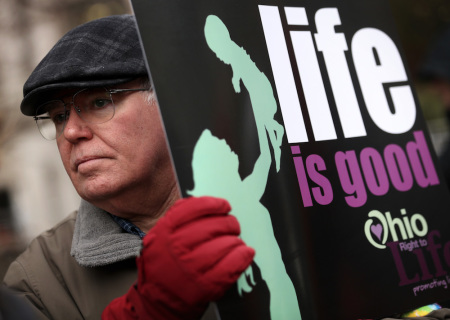Planned Parenthood has ‘no right to perform abortions,' Ohio can defund: 6th Circuit

The U.S. Sixth Circuit Court of Appeals overturned an earlier ruling against an Ohio law that strips Planned Parenthood and other abortion clinics public health funding.
In a split en banc ruling, the federal appeals court has seemingly paved the way for the Buckeye state to no longer give tax dollars meant for non-abortion public health matters to organizations that perform abortions.
The majority of the court ruled that the Ohio law, passed in 2016 to mandate that the Ohio Department of Health refuse funding to any entity that performs elective abortions, was not unconstitutional. The court reasoned that abortion organizations “do not have a due process right to perform abortions.”
The majority opinion, written by George W. Bush-appointee Judge Jeffery Sutton, even cites the U.S. Supreme Court’s ruling in the 1992 case of Planned Parenthood v. Casey in which the nation’s high court ruled that a state can’t place an undue burden on a woman’s right to get an abortion.
“Today’s plaintiffs do not have a Fourteenth Amendment right to perform abortions,” the court ruled. “The Supreme Court has never identified a freestanding right to perform abortions. To the contrary, it has indicated that there is no such thing.”
“Any doubt about the point is confirmed by the debate at hand in Casey,” the opinion adds.
“The abortion providers claimed that a Pennsylvania law, requiring them to inform their patients of the abortion procedure’s details and alternatives at least 24 hours beforehand, violated their patients’ due process rights and their own due process rights that arose from their relationship with patients. The plurality rejected both claims. Abortion rights do not arise from the provider-patient relationship ‘[o]n its own,’ the Court reasoned.”
The ruling comes after a three-judge bench from the Sixth Circuit ruled last year that the Ohio law would make it harder for women to access health care services.
In Tuesday’s majority ruling, Sutton argued that the Ohio law actually makes health care programs “available to every woman, whether she seeks an abortion or not.”
“Nor, on this record, has there been any showing that the Ohio law will limit the number of clinics that offer abortions in the State,” the opinion states. “A review of the Supreme Court’s decisions in the area fails to reveal a single one in which the plaintiff obtained relief based on a restriction of unprotected activity.”
Sutton also shot down Planned Parenthood’s claims that clinics would be forced to stop providing abortions in order to receive government funding by noting that affiliates from both Planned Parenthood entities involved in the case testified that they would forgo government funding in order to continue performing abortions.
The majority opinion also notes that the only other appellate circuit in the U.S. to “squarely address” the issue “reached the same conclusion.” The opinion is referencing the Seventh Circuit’s 2012 ruling in Planned Parenthood v. Commissioner of Indiana State Department of Health. That case dealt with a similar funding law in Indiana.
“The first step in any unconstitutional-conditions claim is to identify the nature and scope of the constitutional right arguably imperiled,” the Seventh Circuit opinion states.
A dissent was authored by judge Helene N. White, a fellow George W. Bush appointee. White claimed that the ruling gives the government the “authority to impose almost any condition it wants on abortion providers” just as long as the providers continue to perform abortions.
“[T]he Supreme Court has never suggested that a party that could prevail in challenging a direct regulation is nevertheless powerless to challenge a law that attempts to achieve the same result by imposing a condition on unrelated funding,” White argued. “This type of assault on a constitutional right is precisely the type of harm the unconstitutional-conditions doctrine is meant to protect against.”
As Politico reports, four of the 11 judges who sided with Ohio in the ruling were appointed by President Donald Trump. Additionally, Eric Murphy, an attorney who argued on Ohio’s behalf, was appointed to the Sixth Circuit and was confirmed in early March.
Ohio Right to Life, a state-level pro-life organization that was a major supporter of the 2016 law, celebrated the ruling.
“Thanks to this very encouraging decision, Ohioans of conscience won't have to worry about whether their tax dollars are going towards abortions,” Ohio Right to Life President Michael Gonidakis said in a statement.
The court’s ruling was also praised by Catherine Glenn Foster, president and CEO of the national pro-life organization Americans United for Life. AUL filed an amicus brief in the case.
“As the full Sixth Circuit Court of Appeals has made clear today, Planned Parenthood, America’s biggest abortionist, has no constitutional ‘right’ to offer women abortions, nor to receive public taxpayers dollars for doing so,” Foster stressed.
“AUL applauds the court’s strong denunciation of Planned Parenthood’s ‘Big Lie’ that it represents the best interests of women when it advocates for the kind of unlimited abortion on demand that New York recently adopted. And we look forward to a similar conclusion by the federal courts affirming this Administration’s decision to keep Title X funds out of the hands of abortionists like Planned Parenthood.”
Last month, 22 states, the Planned Parenthood Federation of America and the American Medical Association sued the Department of Health and Human Services for passing a similar rule that prohibits clinics from performing abortions if they wish to receive Title X Family Planning Program funding.
Follow Samuel Smith on Twitter: @IamSamSmith
or Facebook: SamuelSmithCP





















